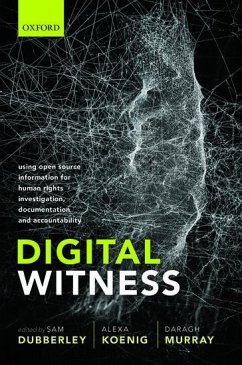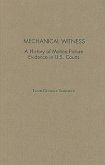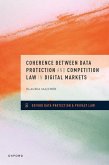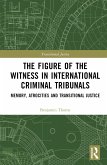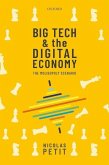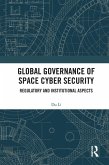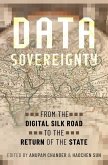Digital Witness
Using Open Source Information for Human Rights Investigation, Documentation, and Accountability
Herausgeber: Dubberley, Sam; Murray, Daragh; Koenig, Alexa
Digital Witness
Using Open Source Information for Human Rights Investigation, Documentation, and Accountability
Herausgeber: Dubberley, Sam; Murray, Daragh; Koenig, Alexa
- Gebundenes Buch
- Merkliste
- Auf die Merkliste
- Bewerten Bewerten
- Teilen
- Produkt teilen
- Produkterinnerung
- Produkterinnerung
This book covers the developing field of open source research and discusses how to use social media, satellite imagery, big data analytics, and user-generated content to strengthen human rights research and investigations. The topics are presented in an accessible format through extensive use of images and data visualization.
Andere Kunden interessierten sich auch für
![Mechanical Witness Mechanical Witness]() Louis Georges SchwartzMechanical Witness76,99 €
Louis Georges SchwartzMechanical Witness76,99 €![Coherence Between Data Protection and Competition Law in Digital Markets Coherence Between Data Protection and Competition Law in Digital Markets]() Klaudia MajcherCoherence Between Data Protection and Competition Law in Digital Markets137,99 €
Klaudia MajcherCoherence Between Data Protection and Competition Law in Digital Markets137,99 €![The Figure of the Witness in International Criminal Tribunals The Figure of the Witness in International Criminal Tribunals]() Benjamin ThorneThe Figure of the Witness in International Criminal Tribunals182,99 €
Benjamin ThorneThe Figure of the Witness in International Criminal Tribunals182,99 €![Big Tech and the Digital Economy Big Tech and the Digital Economy]() Nicolas PetitBig Tech and the Digital Economy155,99 €
Nicolas PetitBig Tech and the Digital Economy155,99 €![Global Governance of Space Cyber Security Global Governance of Space Cyber Security]() Du LiGlobal Governance of Space Cyber Security204,99 €
Du LiGlobal Governance of Space Cyber Security204,99 €![Fairness and Rights in International Criminal Procedure Fairness and Rights in International Criminal Procedure]() Sophie RigneyFairness and Rights in International Criminal Procedure149,99 €
Sophie RigneyFairness and Rights in International Criminal Procedure149,99 €![Data Sovereignty Data Sovereignty]() Data Sovereignty166,99 €
Data Sovereignty166,99 €-
-
-
This book covers the developing field of open source research and discusses how to use social media, satellite imagery, big data analytics, and user-generated content to strengthen human rights research and investigations. The topics are presented in an accessible format through extensive use of images and data visualization.
Hinweis: Dieser Artikel kann nur an eine deutsche Lieferadresse ausgeliefert werden.
Hinweis: Dieser Artikel kann nur an eine deutsche Lieferadresse ausgeliefert werden.
Produktdetails
- Produktdetails
- Verlag: Oxford University Press (UK)
- Seitenzahl: 384
- Erscheinungstermin: 19. Februar 2020
- Englisch
- Abmessung: 249mm x 173mm x 28mm
- Gewicht: 885g
- ISBN-13: 9780198836063
- ISBN-10: 0198836066
- Artikelnr.: 58120219
- Herstellerkennzeichnung
- Libri GmbH
- Europaallee 1
- 36244 Bad Hersfeld
- gpsr@libri.de
- Verlag: Oxford University Press (UK)
- Seitenzahl: 384
- Erscheinungstermin: 19. Februar 2020
- Englisch
- Abmessung: 249mm x 173mm x 28mm
- Gewicht: 885g
- ISBN-13: 9780198836063
- ISBN-10: 0198836066
- Artikelnr.: 58120219
- Herstellerkennzeichnung
- Libri GmbH
- Europaallee 1
- 36244 Bad Hersfeld
- gpsr@libri.de
Sam Dubberley is a research consultant with the Human Rights Big Data and Technology project at the University of Essex, and Special Adviser in the Crisis Response team at Amnesty International. Sam worked for more than a decade in broadcast journalism, and was head of News Exchange at the European Broadcasting Union between 2010 and 2013. He is a fellow of the Tow Center for Digital Journalism at Columbia University, a founding partner of First Draft News, which gives practical and ethical guidance in how to find, verify and publish content sourced from the social web. He is also a part of the Open Source for Human Rights project team at Swansea University. Alexa Koenig is the executive director of the Human Rights Center (winner of the 2015 MacArthur Award for Creative and Effective Institutions), and a lecturer at UC, Berkeley. She co-founded the Human Rights Investigations Lab which trains students to use open source methods to advance human rights. She is a member of the American Association for the Advancement of Science's Committee on Scientific Freedom and Responsibility, co-chair of the World Economic Forum's Global Future Council on Technology and Human Rights, and a member of the Technology Advisory Board of the International Criminal Court's Office of the Prosecutor. She has a JD from the University of San Francisco and an MA and a PhD from UC Berkeley. Daragh Murray is Senior Lecturer at the University of Essex School of Law and Human Rights Centre, and the Director of the Digital Verification Unit based at the Human Rights Centre Clinic. His research focuses on issues relating to conflict and counter-terrorism, as regulated by the law of armed conflict and international human rights law. He has a particular interest in the regulation and engagement of non-State armed groups, and in the use of technology, particularly in an intelligence agency and law enforcement context. He is a former Government of Ireland IRCHSS Research Scholar, and has a PhD in Law from the University of Essex, an LLM in International Human Rights Law from the Irish Centre for Human Rights, and an MSc in Computer Security and Forensics from Dublin City University.
* Foreword
* Section One
* Introduction
* 1: Christoph Koettl, Daragh Murray, Sam Dubberley: The History of the
Use of Open Source Investigation for Human Rights Reporting
* 2: Alexa Koenig: The History of Open Source Investigations for Legal
Accountability
* 3: Lindsay Freeman: Prosecuting Grave International Crimes Using Open
Source Evidence: Lessons from the International Criminal Court
* 4: Ella McPherson, Isabel Guenette Thornton, Matt Mahmoudi: Open
Source Investigations and the Technology-Driven Knowledge Controversy
in Human Rights Fact-Finding
* 5: Scott Edwards: Open Source Investigations for Human Rights:
Current and Future Challenges
* Section Two
* 6: Paul Myers: How to Conduct Discovery Using Open Source Methods
* 7: Yvonne Ng: How to Effectively Preserve Open Source Information
* 8: Jeff Deutsch and Niko Para: Targeted Mass Archiving of Open Source
Information: A Case Study
* 9: Aric Toler: How to Verify User-Generated Content
* 10: Micah Farfour: The Role and Use of Satellite Imagery in Open
Source Investigations
* Section Three
* 11: Zara Rahman and Gabriela Ivens: Ethics in Open Source
Investigations
* 12: Sam Dubberley, Margaret Satterthwaite, Sarah Knuckey, Adam Brown:
Open Source Investigations: Vicarious Trauma, PTSD, and Tactics for
Resilience
* 13: Joseph Guay, Lisa Rudnick: Open Source Investigations:
Understanding Digital Threats, Risks, and Harms
* Section Four
* 14: Fred Abrahams, Daragh Murray: Open Source Information: Part of
the Puzzle
* 15: Alexa Koenig, Lindsay Freeman: Open Source Investigations for
Legal Accountability: Challenges and Best Practices
* Section One
* Introduction
* 1: Christoph Koettl, Daragh Murray, Sam Dubberley: The History of the
Use of Open Source Investigation for Human Rights Reporting
* 2: Alexa Koenig: The History of Open Source Investigations for Legal
Accountability
* 3: Lindsay Freeman: Prosecuting Grave International Crimes Using Open
Source Evidence: Lessons from the International Criminal Court
* 4: Ella McPherson, Isabel Guenette Thornton, Matt Mahmoudi: Open
Source Investigations and the Technology-Driven Knowledge Controversy
in Human Rights Fact-Finding
* 5: Scott Edwards: Open Source Investigations for Human Rights:
Current and Future Challenges
* Section Two
* 6: Paul Myers: How to Conduct Discovery Using Open Source Methods
* 7: Yvonne Ng: How to Effectively Preserve Open Source Information
* 8: Jeff Deutsch and Niko Para: Targeted Mass Archiving of Open Source
Information: A Case Study
* 9: Aric Toler: How to Verify User-Generated Content
* 10: Micah Farfour: The Role and Use of Satellite Imagery in Open
Source Investigations
* Section Three
* 11: Zara Rahman and Gabriela Ivens: Ethics in Open Source
Investigations
* 12: Sam Dubberley, Margaret Satterthwaite, Sarah Knuckey, Adam Brown:
Open Source Investigations: Vicarious Trauma, PTSD, and Tactics for
Resilience
* 13: Joseph Guay, Lisa Rudnick: Open Source Investigations:
Understanding Digital Threats, Risks, and Harms
* Section Four
* 14: Fred Abrahams, Daragh Murray: Open Source Information: Part of
the Puzzle
* 15: Alexa Koenig, Lindsay Freeman: Open Source Investigations for
Legal Accountability: Challenges and Best Practices
* Foreword
* Section One
* Introduction
* 1: Christoph Koettl, Daragh Murray, Sam Dubberley: The History of the
Use of Open Source Investigation for Human Rights Reporting
* 2: Alexa Koenig: The History of Open Source Investigations for Legal
Accountability
* 3: Lindsay Freeman: Prosecuting Grave International Crimes Using Open
Source Evidence: Lessons from the International Criminal Court
* 4: Ella McPherson, Isabel Guenette Thornton, Matt Mahmoudi: Open
Source Investigations and the Technology-Driven Knowledge Controversy
in Human Rights Fact-Finding
* 5: Scott Edwards: Open Source Investigations for Human Rights:
Current and Future Challenges
* Section Two
* 6: Paul Myers: How to Conduct Discovery Using Open Source Methods
* 7: Yvonne Ng: How to Effectively Preserve Open Source Information
* 8: Jeff Deutsch and Niko Para: Targeted Mass Archiving of Open Source
Information: A Case Study
* 9: Aric Toler: How to Verify User-Generated Content
* 10: Micah Farfour: The Role and Use of Satellite Imagery in Open
Source Investigations
* Section Three
* 11: Zara Rahman and Gabriela Ivens: Ethics in Open Source
Investigations
* 12: Sam Dubberley, Margaret Satterthwaite, Sarah Knuckey, Adam Brown:
Open Source Investigations: Vicarious Trauma, PTSD, and Tactics for
Resilience
* 13: Joseph Guay, Lisa Rudnick: Open Source Investigations:
Understanding Digital Threats, Risks, and Harms
* Section Four
* 14: Fred Abrahams, Daragh Murray: Open Source Information: Part of
the Puzzle
* 15: Alexa Koenig, Lindsay Freeman: Open Source Investigations for
Legal Accountability: Challenges and Best Practices
* Section One
* Introduction
* 1: Christoph Koettl, Daragh Murray, Sam Dubberley: The History of the
Use of Open Source Investigation for Human Rights Reporting
* 2: Alexa Koenig: The History of Open Source Investigations for Legal
Accountability
* 3: Lindsay Freeman: Prosecuting Grave International Crimes Using Open
Source Evidence: Lessons from the International Criminal Court
* 4: Ella McPherson, Isabel Guenette Thornton, Matt Mahmoudi: Open
Source Investigations and the Technology-Driven Knowledge Controversy
in Human Rights Fact-Finding
* 5: Scott Edwards: Open Source Investigations for Human Rights:
Current and Future Challenges
* Section Two
* 6: Paul Myers: How to Conduct Discovery Using Open Source Methods
* 7: Yvonne Ng: How to Effectively Preserve Open Source Information
* 8: Jeff Deutsch and Niko Para: Targeted Mass Archiving of Open Source
Information: A Case Study
* 9: Aric Toler: How to Verify User-Generated Content
* 10: Micah Farfour: The Role and Use of Satellite Imagery in Open
Source Investigations
* Section Three
* 11: Zara Rahman and Gabriela Ivens: Ethics in Open Source
Investigations
* 12: Sam Dubberley, Margaret Satterthwaite, Sarah Knuckey, Adam Brown:
Open Source Investigations: Vicarious Trauma, PTSD, and Tactics for
Resilience
* 13: Joseph Guay, Lisa Rudnick: Open Source Investigations:
Understanding Digital Threats, Risks, and Harms
* Section Four
* 14: Fred Abrahams, Daragh Murray: Open Source Information: Part of
the Puzzle
* 15: Alexa Koenig, Lindsay Freeman: Open Source Investigations for
Legal Accountability: Challenges and Best Practices

